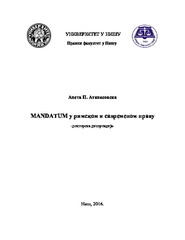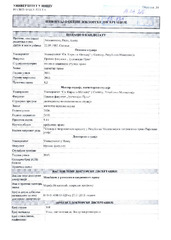Приказ основних података о дисертацији
Mandatum u rimskom i savremenom pravu
| dc.contributor.advisor | Ignjatović, Marija V. | |
| dc.contributor.other | Nikolić, Dragan K. | |
| dc.contributor.other | Naumovski, Goce | |
| dc.creator | Atanasovska, Aneta P. | |
| dc.date.accessioned | 2017-07-15T07:30:43Z | |
| dc.date.available | 2017-07-15T07:30:43Z | |
| dc.date.available | 2020-07-03T16:10:34Z | |
| dc.date.issued | 2016-08-29 | |
| dc.identifier.uri | https://nardus.mpn.gov.rs/handle/123456789/8382 | |
| dc.identifier.uri | http://eteze.ni.ac.rs/application/showtheses?thesesId=5108 | |
| dc.identifier.uri | https://fedorabg.bg.ac.rs/fedora/get/o:1354/bdef:Content/download | |
| dc.identifier.uri | http://vbs.rs/scripts/cobiss?command=DISPLAY&base=70052&RID=1026574497 | |
| dc.description.abstract | Contract of mandate is a contract by which one party (the proxy) requires that without or for a fee undertakes certain legal transactions in the name and on behalf of another party (authoriser), which gives authority to the job. The subject of this contract is not material, but a legal transaction. This means that the proxy in the name and for the account of the principal states will, in terms of the conclusion of a specific legal transaction. However, by taking legal work on behalf of the principal, the proxy does not become a creditor or the debtor, but it remains authoriser. In other words, undertaking legal work on behalf of others, means that legal facts organized in this way, or performed legal transactions directly satisfy the principal and at the same time and all of the possible effects that these products belong to the principal legal affairs, since the attorney concluded legal work on behalf of the principal. In modern law the scope of legal activities that can be undertaken through a representative, it is really great and distinct. Today, in contemporary law, accepted rule is that legal issues can take proxies unless law expressly does not prohibit it. For example, the possibility of representation is not permissible in the will. This definition of the term contract authorization point to the fact that this is only one possible way of representation. Representing such a legal relationship on the basis of which a person takes legal affairs in the name and on behalf of another person, based not only on the agreement of the contracting parties but also on other acts, such as the law, the statute of the legal person, court decisions etc. Contract of mandate has its origins in Roman times, and therefore from the Roman law. At the time this contract had certain peculiarities that today, the contemporary law does not recognize. First of all, the old Roman law does not recognize the principle on which basis legal matters can be taken in someone else's name and for someone else, but it was thought that the legal work is done by only those persons who directly conclude a specific legal transaction. Even later, when there was a need for guidance of else’s affairs, the principle used provided that the attorney takes legal affairs for the grantor always in his own (the attorney’s) name. In further, this meant that the attorney from the moment of conclusion of the legal transaction became a creditor or a debtor, with the obligation to transfer effect of a legal transaction to the grantor. In Roman law, the authorized person could undertake factual jobs, not just legal, provided that he is not seeking any reward for the undertaken work. In further, this meant that, in the initial stage of development of Roman law, this agreement was amicable and based on trust and, therefore belongs to the group of good legal jobs. So, mandatum was concluded with a friend or a person that owed a favor. According to Romans, this mandate was more an `empirical constatation ` than a` rational principle`. In the further development of Roman law, this agreement was a twosided unequal binding contract (contractus bilateralis inaequalis), since the proxy obliged to perform free some job on behalf of the principal, who gave the warrant for that job to the proxy. Despite the fact that there was no legal obligation on the side of the principal in terms of the award, mandatum was considered contractus bilateralis inaequalis, since the authoriser had an obligation to the attorney, in case that the proxy had costs for the completed work. This agreement belonged to the group of consensual contracts. In short, mandatum in Roman law was a bonded relationship. Its definition is: Mandatum is a contract by which one party (authoriser, mandant) requires the other party (representative, mandator) to perform some affair in its account, and the other side undertakes to perform the obligation for free. When we are talking about the realization of demands of the mandate, the representative had at his disposal actio mandati directa. Mandatum was based on the bearing of personal trust between authoriser and representative, so the death of any of them, led to the termination of authorization given the contract extinguished. Mandator had no right to continue using the authorization if mandant died, nor the heirs of the mandator were obliged to execute the orders which he received from a client. But the obligations of both parties which were in some way completed while they were alive are crossing to the successors of both parties. Also, whenever one party wished to terminate the contract through unilateral cancellation, mandatum would be extinguished. In modern law, the power of attorney has a broad application, and in a practical legal system it occurs frequently. With this contract the person who does not want to, guided by any reasons, participate in a specific legal affair (eg. for reasons of incompetence, incapacity or absence) authorizes another person to work in someone else's name and the account, and in this way, all legal and property effects that would have been achieved in the presence of authoriser, belong to an authoriser. The contemporary law provides an award for the proxy (eg. award for the attorney). The subject of this dissertation will also be the analysis of the development of the power of attorney, in medieval society, through the French Code Civil, the Austrian civil code, the Serbian civil code, the German and the Swiss civil code. In the legal provisions that determine the power of attorney in the Republic of Serbia and the Republic of Macedonia there are no big differences. The only difference is the number of the articles of the Law on Obligations, as well as in other laws that contain provisions devoted to the power of attorney. For example, in the Republic of Macedonia these are the articles 81-86, and in the Republic of Serbia, under number 89-94. Legal provisions that determine the power of attorney in both republics come to the fact that the power of attorney represents an authorization for representation, that authoriser gives to an attorney by the legal transaction. The existence and scope of the power of attorney are independent of the legal relationship on which basis they are given. By law, the proxy may be a legal entity. The attorney can undertake only those legal transactions for which he is authorized. Authoriser can narrow or revoke his authorization, even if he renounced this right in the contract. Revocation of power of attorney and its narrowing has no influence on the third person who has concluded a contract with a representative, or perform other legal work, and did not know nor had to know that the power of attorney is revoked, or narrowed. The power of attorney ceases by termination of a legal entity as a proxy, as well as by the death of a representative. The reason of the similarity of these provisions in the two republics is in the fact that they were once part of the same large country. Thus, legislators are now, in separate states, considering this problem in a similar way. | en |
| dc.format | application/pdf | |
| dc.language | sr | |
| dc.publisher | Универзитет у Нишу, Правни факултет | sr |
| dc.rights | openAccess | en |
| dc.rights.uri | https://creativecommons.org/licenses/by-nc-nd/4.0/ | |
| dc.source | Универзитет у Нишу | sr |
| dc.subject | rimsko pravo | sr |
| dc.subject | Roman law | en |
| dc.subject | contemporary law | en |
| dc.subject | contract | en |
| dc.subject | power of attorney | en |
| dc.subject | general power of attorney | en |
| dc.subject | special power of attorney | en |
| dc.subject | representation | en |
| dc.subject | legal representation | en |
| dc.subject | contract representation | en |
| dc.subject | ugovor o punomoćju | sr |
| dc.subject | punomoćje | sr |
| dc.subject | opšte punomoćje | sr |
| dc.subject | specijalno punomoćje | sr |
| dc.subject | zastupništvo | sr |
| dc.subject | savremeno pravo | sr |
| dc.subject | zakonsko zastupanje | sr |
| dc.subject | ugovorno zastupanje | sr |
| dc.title | Mandatum u rimskom i savremenom pravu | sr |
| dc.type | doctoralThesis | en |
| dc.rights.license | BY-NC-ND | |
| dcterms.abstract | Игњатовић, Марија В.; Николић, Драган К.; Наумовски, Гоце; Aтанасовска, Aнета П.; Мандатум у римском и савременом праву; Мандатум у римском и савременом праву; | |
| dc.identifier.fulltext | https://nardus.mpn.gov.rs/bitstream/id/53926/Disertacija_1.pdf | |
| dc.identifier.fulltext | https://nardus.mpn.gov.rs/bitstream/id/53927/Atanasovska_Aneta_P.pdf | |
| dc.identifier.fulltext | http://nardus.mpn.gov.rs/bitstream/id/53926/Disertacija_1.pdf | |
| dc.identifier.fulltext | http://nardus.mpn.gov.rs/bitstream/id/53927/Atanasovska_Aneta_P.pdf | |
| dc.identifier.rcub | https://hdl.handle.net/21.15107/rcub_nardus_8382 |



